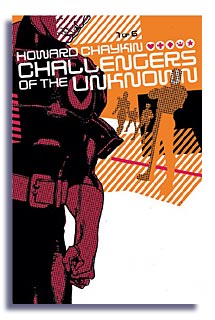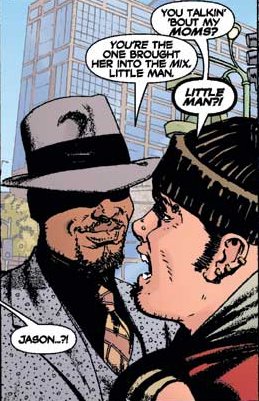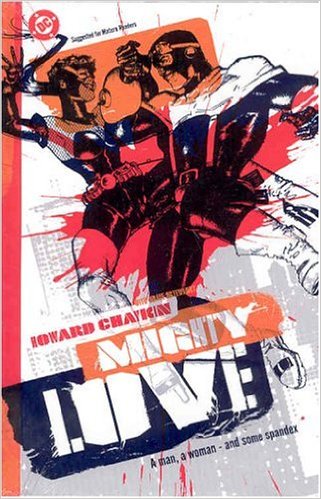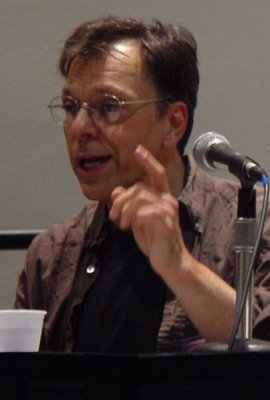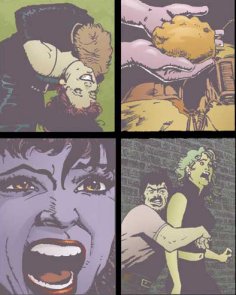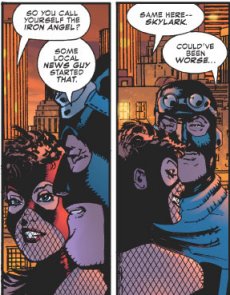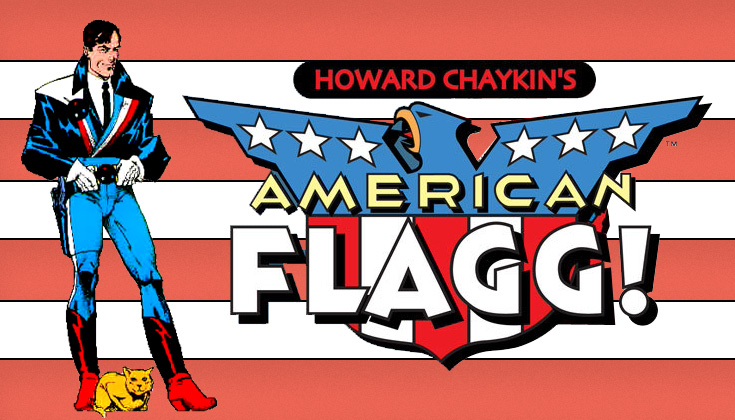
If you don’t know Howard Chaykin, it’s because he’s kept a low profile in comics over the past few years. After spending several years working on a variety of genre television shows from The Flash to Mutant X, Chaykin recently announced that he was coming back to the comics world full time. Sure, he’d dabbled with a short story here and there, and still found time to write a few series including [amazon text=American Century&asin=1563897911] for DC/Vertigo, but the comics world had gone without his full attention for too long.
First he did a 96-page graphic novel for DC called [amazon text=Mighty Love&asin=1563899302], and in just three weeks, we’ll see his take on one of DC’s oldest properties, Challengers of the Unknown, a concept near and dear to DC vice-president Dan DiDio’s heart. Still don’t know Howard Chaykin? As a young artist, he assisted some of the greats of the Silver Age, including Gil Kane and Neal Adams, whom he acknowledges as great influences and great bosses. Going solo, Chaykin initially made a splash among early fandom with trippy work on series like Cody Starbuck and Ironwolf (vampires, tall ships and intergalactic empires before they all became trendy). Readers at large sat up and took notice when Chaykin was tapped to draw the Marvel Comics’ adaptation of a little movie called Star Wars. After ten issues, Chaykin moved on to more adult fare, including Dominic Fortune for Marvel and a pioneering graphic novel with Michael Moorcock called Swords of Heaven, Flowers of Hell.
In the early eighties, Chaykin set comics on their ear with the ground-breaking [amazon text=American Flagg&asin=1582404186], a series that didn’t just synthesize many of his themes into one cohesive work, but also brought page design, lettering and space into the overall effect of a book in a way that few had attempted. He’ll credit Walt Simonson for doing it before him, but it was Chaykin that got the wide-spread notice, and deservedly so. Above all, American Flagg! was an incredible story, and more than a little prescient in its satirical targets. (Dynamic Forces will be reprinting the series in hardcover in the Fall of 2004.)
He moved on to the metaphorically autobiographical Time2 and Black Kiss, a sealed bag series that introduced a few, ahem, vampire kinks to an unsuspecting audience. In the mid-eighties, DC tapped Chaykin to reinterpret the classic pulp hero The Shadow for a modern audience, and after a successful launch, Chaykin turned the reins over to an up and coming young artist named Kyle Baker.
Before Hollywood called him to write TV shows, Chaykin also breathed new life into Blackhawk, returning occasionally to do the odd cover and a memorable Elseworlds or two. Though much of his material has made development execs salivate, including a series for the late Malibu called Power & Glory, he has yet to be tapped to adapt his own work for the screen. But he’s still interested…
At WonderCon, I almost literally ran into Chaykin in the lobby, and he took our near-collision with graciousness and good humor. He invited me to his spotlight forum that night, and we agreed to do an interview later in the week.
My friends, this is a massive one. Minutes into our phone conversation two weeks ago, Chaykin warned me that he liked to digress. I didn’t mind. I had a lot of audio tape, and Chaykin’s digressions were worth listening to.
So fanboys and fangirls, Mr. Howard Chaykin…
Derek McCaw: How did you get involved with the Challengers of the Unknown project? Dan DiDio said it was one of his personal mandates to bring back, but why you?
Howard Chaykin: You know, I don’t know. There you go. He called me. Actually, I think it might have been over breakfast. Dan and I tend to discuss a lot of business over food. I think it’s because we’re both fairly good eaters, we behave nicely and we have good manners.
I’ve always felt that on a title level alone, it’s a great title. He asked if I’d be interested in doing the development process on it. He made it explicit to me that he wanted me to do for the Challengers what I’d done for Blackhawk, for The Shadow and for other projects, which is sort of re-inventing them for a contemporary audience.
I went back and read the material. And I came to a conclusion that was based on a long-standing and long-ranging dialogue that I’ve had with a number of people in the film and television industry and the comic book business, about the difference between period heroes and contemporary heroes.
Beyond the obvious stuff, one of the really major, less overt, differences is the presence of an agenda. One of the things that I found is that it’s an uphill sell with characters and situations where you don’t have a hero and a worthy adversary. When the adversary is simply something that the hero seeks out to find, problems, it becomes melodrama at its core.
So I felt that it was imperative to come up with an agenda for the Challengers of the Unknown. I also felt that the characterizations of those original four characters really existed in a kind of enclosed period universe. Those jobs, those things those guys did, don’t really have a profound relevance in contemporary culture.
I reinvented those characters. They exist in a way where we don’t see them, but we do reference them. They are referred to by a number of people, mostly the villains.
That’s sort of what I’m talking about in terms of an agenda. I’ve got a truly monstrous bad guy against heroes who are not quite as monstrous but getting there.
DM: And you have this as a six-issue mini-series?
Chaykin: The characters themselves and the situation itself will be introduced in the six issues. We end the six issues with the world in place, which leaves it completely open for an ongoing series.
DM: Would you be willing to do that series?
Chaykin: I’ve got a lot of other commitments, but I’d love to write it.
DM: You mentioned Blackhawk and The Shadow, both being series that you put a great stamp on that both fizzled out after you left them.
I thought that the Blackhawk stuff that Marty (Pasko) and Rick (Burchett) did was sensational. I loved that stuff. I’m a huge fan of Rick Burchett and a great fan of Marty Pasko. I thought they did a great job on that Blackhawk in the fifties stuff; that CIA stuff was dynamite.
I must be crazy. I thought it was swell.
The Shadow was odd, but it had some funny moments. I thought what Kyle (Baker) did with Andy (Helfer) was interesting, too.
The fact is that Challengers comes out in June, June 16. And it introduces a kind of a hyper-paranoid world-view which I think may not be true, but is very real. If that makes any sense.
Or vice versa, depending on how you look at it.
DM: What attracts you to revamping long-standing properties when what you’re more known for is wildly original concepts?
Chaykin: I have to think that when I’ve taken these old concepts and rebuilt them, I’ve turned them into wildly original new concepts.
DM: One of the most interesting remarks you made at WonderCon was that you’re trying to attract the older reader, rather than the younger reader everybody else always talks about. Do you think that Challengers of the Unknown fits that goal?
Chaykin: I don’t really know.
The reason I made the remark, and obviously it was semi-facetious, is that I tend to believe that the younger reader doesn’t read. There aren’t a lot of readers among the up and coming kids. Kids no longer read the way that I did for entertainment, or you did. Videogames and big-budget explosive movies have functionally replaced comics as the entry level drug of entertainment.
I think it’s more important to find, frankly, new readers among people who read genre fiction. There was an attempt to try it with science fiction, and there have been a number of attempts to try it with detective fiction. But in all those cases, I think it’s been really conventional approaches to the material.
There are ways to try to reach new audiences. And a new audience isn’t necessarily a kid. I’m older than you, I guarantee it, but I still read hot-blooded adventure fiction and thrillers. That’s my meat.
DM: So what could the industry be doing to attract those readers? You mentioned at Wondercon that in Europe, they have no problem attracting them, with older people reading graphic albums like Lt. Blueberry or Moebius.
Chaykin: One of the things about comic book conventions these days is that you’re seeing more and more wives with their husbands.
For Wondercon, for example, I made an arbitrary decision that I would not do sketches for anybody but young kids and women, just because I figured there wouldn’t be a lot of them. And I did a lot of sketches. Not a lot for kids, because the kids didn’t care. I don’t do the X-Men. But I had a lot of women coming over. I thought perhaps they’d be a lot of wives and girlfriends, but there are also just a lot of women.
I mean, that might be endemic to San Francisco, per se. But in general, I did a lot more sketches than I wanted to or planned to. (laughs)
Damn them! Damn them!
But that’s a good thing. I came into the comic book industry at a time just before women as a readership were dismissed, when the love comics were thrown away. By that time love comics had become a pale imitation of what Simon and Kirby had intended them to be. But there was still an acknowledgment of the female reader.
For example, Mighty Love had its fruition in a conversation I was having with my wife, who couldn’t give a damn about comic books. She asked me why there weren’t any more love comics.
I explained to her, in a sort of Sermon on the Mount way, that all comics are love comics. All these books are soap operas.
But then I started thinking about it, going, “wait a minute, there’s lots of different kinds of love.” I mean, my favorite romantic films are screwball comedies. And that’s where Mighty Love got started.
DM: Yes, it reminded me a lot of The Shop Around The Corner.
Chaykin: That’s exactly right. A man who actually knows the original reference. I mean, I’ve heard it referred to as You’ve Got Mail with superheroes. But I’m a guy who goes back.
Also She Loves Me, the musical comedy version starring Daniel Massey and Barbara Cooke. So there you go.
DM: Did it work? Did your wife then enjoy Mighty Love?
Chaykin: She hasn’t read it yet. She’s convinced that there’s an encoding to comic books that she can’t grasp. One of the things that you and I have to realize is that we live in a jargonate culture. And there’s a lot of normal people out there.
It’s kind of like, and this is no affront to my wife, we all hear stories about the Red Train in Russia in 1917 and 18, that was traveling around the provinces of Eastern Russia. It was showing movies of the Revolution, and the peasants were totally freaked out by this clearly ungodly process of movies. My wife looks at a comic book and has no idea where to look first. And we take it for granted. I see where she’s coming from.
DM: Scott McCloud wrote about that in Understanding Comics, that some people just don’t know how to read them.
Chaykin: We’ve had so many fights about this, though we’ve got better things to do with our lives than fight about this shit. But I’ve finally come to the conclusion that there is an issue. And it’s not her mental problem; it’s just that she doesn’t understand the way we do the sort of synergy that exists between pictures and words.
For example, this past weekend I signed off on the final lettering and coloring of Challengers. What I checked for were tangents and organization of space used with the captions and the balloons. And I made one very specific adjustment which my editor, in a semi-facetious way, remarked that I must be really obsessive. The answer is yes. I am really obsessive. But I think it serves the work in a way that demonstrates my interpretation of depth of field and space. The balloons and captions are all part of the picture. They are as important an element as the panels and the page.
DM: Do you teach, or take up-and-comers under your wing, at least? There’s a lot of young guys that can draw one element, but can’t put the whole thing together.
Chaykin: I always have an assistant, because frankly, I’ve been doing this long enough that there’s a lot of stuff I just don’t feel like doing anymore. I always have a guy working with me as sort of a Hound of the Baskervilles or Brom Bones, riding behind me to keep me going. I was an assistant to many of the great lights in the generation before mine, and one of the things you learn is that you can never give back to those guys what you got from them. So your job is to pass it on to the next generation. I’ve had some great people working for me. Everyone from Peter Kuper to Lynn Varley to Don Cameron, who is now a sensational animation designer. I’ve got a guy working for me right now who is absolutely sensational.
If I were living in New York City, in all likelihood I would be teaching at the School of Visual Arts, because I like the sound of my own voice. But I also think I learned a great deal from teaching. It’s one of those great clichéd truisms that happens to be real. I always find it difficult to do portfolio review. Because what I expect of the material, what I understand about the material, what I know about the material, has so little relationship to what most guys who are in the comic book business as professionals or even fans have. It’s like Venus and Mars.
One of the first things I do with any guy I hire is give him Harvey Kurtzmann’s Two-Fisted Tales and Front-line Combat. I give him Milton Caniff’s Terry and the Pirates. It’s historically the first, and for my money greatest, example of what we do. More than Prince Valiant or any of that other stuff. It’s pure core storytelling. I also feel that to a great extent Wash Tubbs is a little too obscure for them. Terry and the Pirates is more accessible than Wash Tubbs.
I mean it.
Buzz Sawyer is more accessible, but by that time, he’s gotten slick. But you look at Caniff, and you see the evolution of what he did with Terry in his first year and it’s unbelievable. Take a look at the dailies alongside the Sundays and you’re going what the hell is he doing? By 1937 and 38, everything’s in place, and he’s just inventing the stuff that we do. Kurtzmann is just the best writer in comics in his time. He understood the relationship between narrative visuals and captions. He was a word counter. His structure is just mind-boggling.
But the problem is that both of these guys, neither has the flash and dash of a Lou Fine and his descendants, or Will Eisner and his descendants. But I think you can learn more from those other guys, then apply the flash and dash to narrative structure.
DM: You mentioned that you don’t get a lot of kids because you don’t do The X-Men…
Chaykin: Why haven’t I done The X-Men?
DM: Well, there are definitely mature themes running through your work. But would you ever be tempted to do something that is more appropriate for, shall we say, all ages?
Chaykin: I don’t know. The fact is that Challengers is going to confuse and confound my audience because there’s no sex in it. Sorry, kids.
It’s more about paranoia and fear. It’s good-looking people. It could be a code book. It’s definitely not a mature readers book. Know that right up top. I’m not sure that my drawing style is applicable to that sort of thing. I was a teen-age dad. That’s one of secrets of the comics that they don’t talk about in the books. So I have grandchildren. I look good. But I do have grandchildren. I have a four and a half year old granddaughter, a year old granddaughter and a three week old grandson.
I’ve been drawing for the eldest, because she loves pirates. And I’ve tried to work in a style that’s fun for a four and a half year old. I’m not sure I have those goods in me, if that makes any sense.
On the other hand, I might add, that it’s always amused me that so many pornographers would make great children’s book illustrators and vice versa. But that’s another story.
DM: You give me a good segue. At Wondercon you made a joke about trying to get Black Kiss made into a film.
Chaykin: That’s no joke.
DM: Could American culture stand such a thing?
Chaykin: I think [amazon text=Black Kiss&asin=1606900218] is one of the funniest things I’ve ever done, a darkly funny comedy. I did at a turning point in my life. I turned the point and now I’m done. There’s no reason that film couldn’t be made. I don’t think it would be a PG-13, but it could be done anywhere from a hard R to an X.
You could do that film with a hard R, by making implicit what is explicit. There’s no reason it couldn’t be. And there have been a number of situations where it was almost there. We’ve had a number of almosts, in the first place with a semi-well-known Canadian actress, another time with a very well-known American director. Hollywood is filled with almosts. I’m still hoping someday to get it happening. That’s one of the reasons that I like that it remains in print.
DM: It’s a far cry from your early days drawing Star Wars. Not to dwell on that work, but you have made the comment that Star Wars paved the way for Ronald Reagan to be elected. Would you explain that?
Chaykin: What’s weird is that I made this comment several years ago. Then I saw a very similar remark to that effect in a wonderful book called Seeing Through The Movies. I think that Star Wars and similar films of the seventies made it possible for the electorate to sort of put their minds on hold and go with their feelings, more than they ever had before. It was a real turning point in American culture.
It’s another remark, I think in Power & Glory, where the President’s talking about the space program being in trouble because people are more interested in Star Wars than real stuff. Because the real stuff is boring. I mean, they just don’t look good; the suits don’t look cool. It’s one of the reasons why, I think, in the late seventies and early eighties there was a major overhaul and redesign of spacesuits to make them look hipper.
I think that people have always liked a man on a white horse, and Reagan was a man on a white horse. He managed to portray Jimmy Carter as a creature of indecision, and indecision is always perceived as an unheroic act. And I think we’re paying the price for that.
I am not, as you might guess, a Republican.
On the other hand, I find myself in the curious position of actually considering the possibility that there is actually a Republican politician in this country who I would vote for. John McCain. I have an immense respect for him on so many levels. He’s the most interesting politician alive, certainly out there with a public face, that I’ve seen in years. And I’m grateful that he’s not running with Kerry.
I think that his personality, his anger, his passion is enormously appealing.
DM: So let’s tie this back to Challengers of the Unknown. Do you think that the fictional paranoia you’ve set up fits with today’s situation?
Chaykin: Oh, absolutely. I explained to somebody that Challengers was based on a line from Gore Vidal. I’m a huge Gore Vidal fan, both as a writer of fiction and as an essayist. I’m paraphrasing, but he made a reference in a piece once to “…the people behind the scenes who hire the men every four years who play our president.” And that stuck with me.
That’s sort of what Challengers is about: paying attention to the man behind the curtain instead of letting it go and hoping everything will be fine. It’s about the machinations of the man behind the curtain.
DM: What is it about comics that has lured you back from the lucrative career doing television?
Chaykin: The money that you earn from doing television comes at a price: heart, soul and stomach.
When I left the show I was working on, in the space of a couple of months I lost thirty-five pounds, started sleeping better and found my head, my emotional state, level of serenity and spirituality was greatly heightened. I was no longer rage-filled. I was no longer berserk. I was happy.
It finally all happened out of circumstance. I left the show in June, and in Hollywood, by June the jobs are all gone. The schedules are announced in mid-May, and by June there’s no work. The best that I could have hoped at that point was to get a job come Thanksgiving. That’s about it.
I found myself in the position of not having to work, because that was part of my contract. But I wasn’t going to sit on my ass for six months because I don’t do that sort of thing. So I pitched a book to DC on a Friday, and they bought it the following Tuesday. Which I have since learned is a record. And that became Mighty Love. I approached Mighty Love with enormous fear, because I hadn’t drawn anything of real volume in years. I’d done short pieces here and there, the odd cover, but it was an extended narrative. We’re talking 96 pages.
And I discovered that my chops were in better shape than they had any right to be. There were things I never used to be able to do that I could do now, and there were things that I used to be able to do that I could do better.
I don’t recommend taking ten years off from your career, but it worked for me. And I discovered that I really liked it. Half-way through the book, I was talking to my wife and I said, “how would you feel if we didn’t have the kind of money that we’re used to having?”
She said, “you’re happier, you’re healthier, you don’t make me crazy; I’ll live with it.” And that was that. Now she’s paying the price because she’s working her ass off trying to catch up, but she is an absolute bulldog when it comes to work. Very much like me; the both of us are very work-committed.
I decided to stay in comics. I’m still available for other stuff, but I’m not actively insanely pursuing it. I’m pretty happy doing what I’m doing. Life is good.
DM: Who currently working in comics interests you?
Chaykin: I love 100 Bullets. It feels like the work of one man, and for me there is no greater compliment. It’s a great synergy of talent. I love what Dave Johnson is doing. I think he’s sensational in both black and white and in color. He’s one of the smartest artists I’ve ever seen. I’m really digging Phil Noto’s stuff. I like this new guy, Leinil Yu. A whole other way to think about the figure and the head. It’s just really nice.
I love what Alan Moore is doing on ABC. I really love Tom Strong, because it’s a great pastiche of stuff that interests me. I really miss Top Ten. I thought it was swell. I’m not a big fan of Promethea, because I’m an American Jew and I just don’t get it. It has no resonance for me whatsoever. I love what Jim Williams is doing, but I just don’t get the book; it’s too f*****g English.
I love Adam Hughes’ stuff. That good girl stuff just kills me; it’s really funny.
Who else? I’m hurting people’s feelings. I also have to say that I’m absolutely stunned and delighted to see John Severin working. Two guys that I was a big fan of were John Severin and Russ Heath.
DM: Yes, I see the Severin…
Chaykin: Nobody ever pointed out the huge influence that John Severin had on me. I feel that to a large extent American Flagg! is Alex Toth and Severin connected. I’ve always been a fan, back to the Harvey Kurtzmann days. Seeing the work he did for me on American Century and for Judd Winick on Caper, f*****g A!
The same for Russ. Did you see the second half of Enemy Ace? My god… On the basis of that, Russ is doing a huge four-parter that I’ve written, which will hopefully be published before he dies doing it. It’s an astonishing piece of work. It will completely reinvent the way people look at Russ Heath. It’s a year away at least, but it’s that good.
DM: Would you like to give one last pitch for Challengers before I go?
Chaykin: Buy the book or I’ll kill you. Just kidding.
People always accuse me of being cynical when it’s really being skeptical. They mistake an honest statement for cynicism. We’re surrounded by cynics that will pander to the audience and tell them what they want to hear just to get their attention. Challengers, for me, was a difficult book to do. It was a lot of fun to do. The response I’ve gotten at the office has been extremely gratifying.
I think it’s going to be a book that a lot of people will be angered by but delighted by as well. I had a great time with it, and I think that the joy and fun I’m having with the material comes through on the page. On every level, from the lettering by Richard Starkings at ComicCraft, to the coloring by Michelle Madsen, who is going to break out and become a monster because of the work she’s done here.
I’m really excited and looking forward to seeing it on the stands. For you it’s every month on the newsstand, for me it’s every morning on my desk. I’ve been living with this for a long time. The first issue just went to the printer yesterday. I’m in the process of penciling issue four, and I’ve written to issue six. My reference file is just getting bigger and bigger.
I love this stuff. Read my book.
And so, Howard said good-bye with the vague threat that he would be appearing EVERYWHERE this summer in San Diego. There would be no escaping Howard Chaykin, though he chastised my youth for calling it Comic-Con. To the older pros, it’s the San Diego Show.
No matter what you call it, I look forward to seeing Chaykin there with whatever he has to offer.


